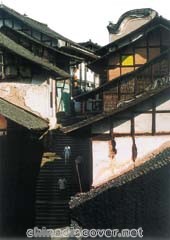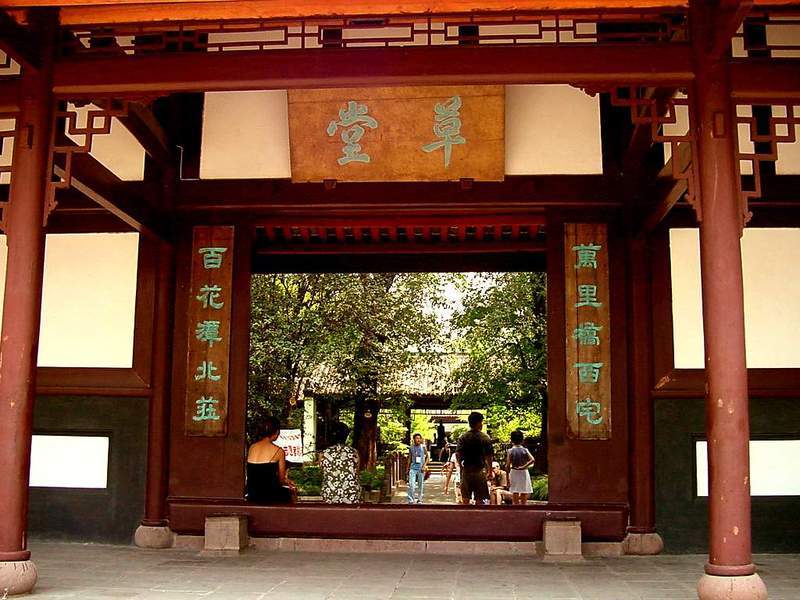Fubao

We came across Fubao (fortune and treasure) Town by chance during a trip to Fobao (Buddhist Treasure) Mountain in Sichuan Province. Cloaked in dense forest, watered by rivers and waterfalls, and the habitat of various wild animals, the mountain is 46 kilometers from Hejiang County, Luzhou City. At its foot nestles the small secluded town of Fubao, little changed throughout the centuries.
First emerging in the late Song Dynasty, Fubao Town took shape during the Ming Dynasty. Encircled by mountains and waters, the town is still in the style of the Ming and Qing. Rows of stilted wooden buildings span the hillside. Between them are flagstones that wind and meander upwards to the mountain, some as wide as 4 meters, others so narrow as to require walking in single file. Most of the buildings are two-story. Business is conducted in the rooms facing the street, and domestic life goes on in those at the rear. White walls, gray tiles, and paved blue-stone courtyards are characteristic features of southern Sichuan dwellings.
Ruins housing ancient temples, pagodas, sculptures and murals testify to Fubao's long history. Tang folk arts such as Gaosheng song, folk music, Dengxi Opera and lion dances are still popular here. Fubao's specialty dishes are flaky pastry, dried bean curd, wild flower honey and plum wine.
Its remote location and under-developed state give Fubao a rather desolate look, but most of its old buildings have been well preserved. This has made the town a popularly selected location for TV series about the province. As Fubao is unknown to the majority of tourists, it is still relatively uncommercial.
On arrival, I took a stroll around the town. There were few people about. One or two elders dozed under a tree, some women sat and embroidered, and a small group of children played, or did their homework. Fubao is free of the normal fuss, noise and bustle of most towns.
small group of children played, or did their homework. Fubao is free of the normal fuss, noise and bustle of most towns.
The next day was bazaar day, when villagers from the rear mountains go to town in a steady stream, taking with them fowls, vegetables and mountain produce. On displaying their goods on the street, they wait equably for buyers to come along.
The local residents are hospitable, and quite unfazed by curious tourists dropping in for a look inside their homes. They are also happy to pose for photographs on request.
The name Fubao comes from a legend. Long ago there lived a beautiful and virtuous woman called Xiu E. One day the family was robbed by bandits and left penniless. Xiu E's son died of starvation, her mother-in-law went blind with grief, and her husband fell ill. heart-broken Xiu E went to the river bank to dig a grave for her son, and in the process unearthed a glossy stone. On her taking it home, a miracle occurred. Her son came back to life, her husband recovered, and her mother-in-law regained her sight. The rock was regarded as sacred, and the site as having geomantic significance, which drew more and more people to it. The town of Fubao thus came into being.





